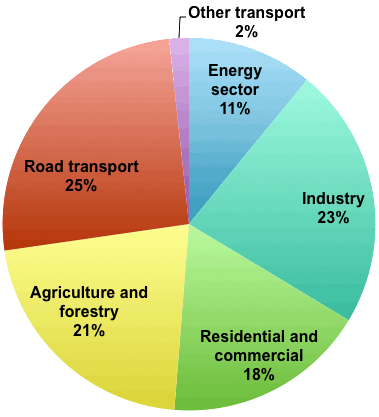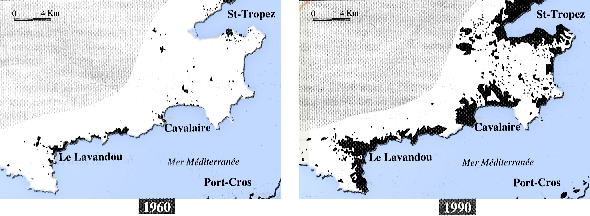Ecology can have two definitions :
- that of the paper, for which it is often sufficient, to deserve this adjective, that one declares to be so, no matter then what the individual does or suggest practically, and even if his suggestions or individual acts are totally contradictory with the opinions supported,
- the recommandation, for himself as for others, of ways to behave that lead, in the facts, to a lesser presssure on the environment.
I have chosen to illustrate how it is possible, just like a character of Moliere (Monsieur Jourdain) that was writing prose without knowing it, to be an ecologist withouyt even thinking of being one, by advocating a behaviour or acting in such a way that the consequence is a better preserved environment (and sometimes the goal is very far from wanting to preserve the environment !).
Jean-Pierre Coffe
The first thought of the reader will probably be to wonder whether I did not receive some heavy object on the head, or whether I did not went down the stairs on the same head, for qualifying Coffe (a french food critic) an ecologist. But… what does the guy say in his last book, “around the family table for15 euros a day” ? (Plon).
- that 150 grammes of meat per person and per day is enough,
- that we should go shopping at the open markent rather than at the supermarket,
- that we must buy products locally produced and in season.
Well, our friend has it all right. Why ?
- the problems caused by agriculture are for a large part the consequence of our desire to eat a lot of meat. More than half of the agricultural land is devoted to feeding animals (that we will eat afterwards) and one should remember that greenhouse gases emissions of the agricultural sector rank first in France.

Breakdown by activity of the greenhouse gases emissions in France for 2001, all gases (except ozone) being taken into account.
The sinks are not taken into account (I don’t know how to deduct them from the various activities !).
Onternational air and sea transportation is not included.
It is noticeable that the agricultural activities rank first. And if we gather all that is emitted to provide food (agriculture, but also transportation and processing of food, including the manufacturing of all the packaging that we will throw away later on) then eating probably accounts for a little third of all emissions.
Source : CITEPA, 2005
In 2000 an average French eats 100 kg of meat per year. But 150 grammes per day -suggested by Coffe – corresponds to only half that amount (150 grammes x 365 days equals 50 kg), and actually it would be even less on average, because the mean value of 100 kg/person/year includes the consumption of hoary old-timers and newborns, that definitely eat less than 100 kg per year.
By suggesting that we cut our meat consumption by half, Jean-Pierre COFFE certainly contributes to a lowering of the nuisances deriving from agriculture, including the greenhouse gases emissions. Implementing this suggestion for the whole french population (dividing the meat consumption by 2) would result in a 5 to 10% decrease of the national total : it isn’t nothing !
- shopping at the hypermarket (or supermarket) is the least “ecological” way to shop : It is impossible to get there without a car, the goods sold are seldom produced locally, therefore travelled a lot before being sold. Various attempts to quantify the difference between an hypermarket and a small intown shop conclude that the first is 2 to 20 times more energy intensive for the same sum spent.By advising to go to the open market rather than to the hypermarket, Jean-Pierre COFFE indirectly suggests to go shopping by foot rather than by car, and indirectly suggests to buy food produced locally (at the open market there are still local truck farmers, brooders, cheese producers…) rather than processed foods that will have travelled hundreds (if not thousands) of km, inducing – by the way – part of the truck flow that we so much want to remove from our roads.
- out of season products have either been grown under a heated greenhouse (generally heated with fuel oil or gas), or been transported from a very remote place, and in all cases it generates extra greenhouse gases emissions.
- And at last when going to the open market one is sure not to get out with a basket half filled with junk food that one never had the intention to buy on his way in (but got tempted by a sophisticated marketing), well all these junk foods lead to greenhouse gases emissions to be produced. At worst, you will leave an open market with a couple of olives, pistachios, and spices for chili con carne that you will never use (I can testify : my cupboards are full up with these !), but there is no danger to spend vast sums on cookies and crackers, various gadgets because one kid saw the ad on TV, or something you will never use just because it is on sale. By avoiding to buy useless stuff, one can at the same time spend more money in high quality food and spend less globally speaking, and all this is pretty good for the environnement (except if the savings are used to travel by plane, buy a larger car, or extend the house, of course…).
The suggestions of Coffe are furthermore the illustration that being an “ecologist” might be joyful and tasteful : speaking from experience, it is far more pleasnt to go shopping at the open market (where, as soon as you are have your habits, salespeople are often joking with you) than taking your basket for a walk in an anonymous hypermarket, and most of all much more tasty once in the plate !
The corsican autonomists
What do the ecologists movements generally look for ?
- the preservation of natural spaces,
- a diminution of nuisances of all kind linked to our modern civilization (noise, various emissions resulting from road trafic, pollution from industries, etc)
- if possible, putting a halt to any project (commercial centers, highways, plants, real estate programs…) that does not comply with the first two objectives.
Well, seen under that angle, one must recognize that coriscans autonomists behave in perfect accordance with all these objectives :
- by creating an atmosphere not very favourable to economic investments, they contribute, in the same time, to the preservation of their island from the nuisances necessarily attached to the “economic development” : no industrial investment, it is the insurance not to have any polluting industry, any flow of trucks, any noise, industrial accidents, etc, and no investment in services companies, it is also less road and air trafic !
- by contributing to giving of Corsica the image of a “country of mad people” – and by blowing up a little something here and there, from time to time, to be sure that everyone remembers it – they also seriously deter investments in tourism, well it is likely that without this deterrence, the corsican coast would ressemble today the “côte d’Azur”, for which the preservation of nature is not precisely a leading trend,

Urbanization evolution of a portion of the “côte d’Azur” between 1960 et 1990.
Dark sports corresponds to new urban areas.
Source : Conservatoire du littoral.
- more generally speaking, the fact of not having Corsica become a new Baleares has seriously limited the nuisances attached to tourism :
- a tourist is a moving person (therefore feeding the transportation inflation), travelling by plane if need be, when air trafic is not precisely the most respectful travel means regarding the environment (see this page for a practical example), or using a car, and then willingly asking for large highways in order not to be stuck in the trafic jams. These same highways will then be used for developping road transport by truck during the rest of the year, and the same tourist, putting on his “neighbour” jacket, will then actively protest against the very same highways during the rest of the year,
- if he feel comfortable in the place he visits and has enough money for that, the tourist will contribute to the rise of real estate prices, what will contribute to a growing urbanization (and incidentally will prevent the local people, that often can’t afford it, to become owners in their own homeland, what can be seen in many regions in the south of France),
- if he likes sailing (which is my case), the tourist will lead to building harbours, that are not always beneficial to the shore,
- the tourist willingly harvests rare flowers, willingly throws waste everywhere, and the list could go on : without the slightest will of being a nasty destroyer, the tourist ineluctably exerts a serious pressure on the environnement. The regions “saved” by a tourism that would have allowed to finance some kind of restoration of nature are totally marginal compared to all the places that toursim has efficiently contributed to degrade from an environmental point of view.
- even corsican agriculture is very respectful of the environnement : cows wander in the mountain, where they peacefully graze, instead of eating non stop maize or wheat coming from intensive agriculture that will have polluted a lot !
Well, in short corsican autonomists are authentic ecologists, since they do all that they can to preserve there island in its present state. Not knowing any, I don’t know whether preserving natural spaces is part of their declared objectives, but their behaviour should bring them the sympathy of any “official” ecologist movements.
Of course, a couple of deaths are associated to this successful policy, but one could say that having avoided a couple of industrial accidents or nasty roads accidents (because of less trucks) gives a balanced result ! So, in order to protect the environment the most efficient way, it seems that creating an autonomist movement is an option to consider very seriously……